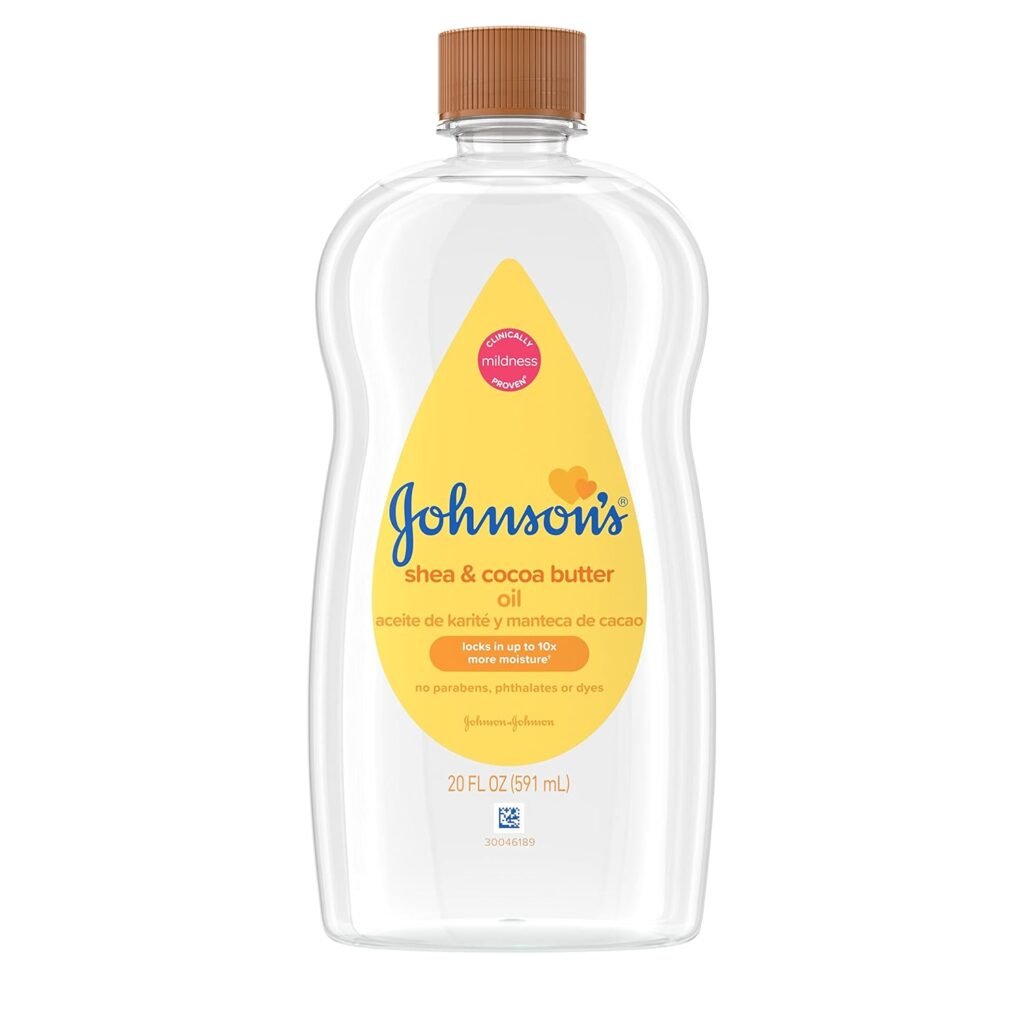As a parent, you probably use baby oil for almost everything, from keeping your baby’s skin moisturized to soothing diaper rash. But one question you may ask yourself is: does baby oil expire? It is relevant to understand the shelf life of the product for safety and effectiveness. While baby oil typically has a long shelf life, factors like storage conditions and the type of oil used can affect its longevity. In this guide, we’ll explore whether baby oil expires, how to properly store it, and what to look for to determine if your bottle is still safe for use.
What is Baby Oil Made Of?

Baby oil is usually formulated with mineral oil, taken from petroleum, and may further contain other ingredients such as fragrances or vitamin E. Most of the time, mineral oil is used because it doesn’t have color or scent and is long-lasting. Some baby oils are formulated with added ingredients, such as aloe vera or chamomile, for added soothing properties. Some of the organic baby oils are based on plant-based oils, like sunflower and jojoba oil. These are less frequently the case. Whatever their differences in formulation, though, baby oil is mild, nonirritating on babies’ sensitive skin, softening and protecting it.
Does Baby Oil Have an Expiration Date?
Baby oil itself does not have an expiration date; however, it has a shelf life, which is usually two to three years from the date of manufacture. It does not spoil like food, but the quality degrades with time. Usually, manufacturers print a “best by” date on the packaging, which can guide you about when the product will be most effective. After this period, the oil can become less fragrant, thin in texture, or even ineffective, especially if not stored properly. Always check for changes in appearance or odor before using baby oil that is past its recommended shelf life.
How Long Does Baby Oil Last?
Baby oil usually lasts for two to three years if stored well. How long it lasts will also depend on the type of oil, additives used, and storage conditions. If the baby oil is unopened and kept in a cool, dry place away from direct sunlight, it can last toward the longer end of that range. Once opened, the oil can last for a couple of years, but one should always check the texture, smell, or color, as these could be signs that the product is no longer effective or safe to use. Always follow the manufacturer’s guidelines for the best results.
How to Properly Store Baby Oil
Proper storage of baby oil maintains its quality and extends its shelf life. Here are some tips on how to store baby oil correctly.
Keep it in a Cool, Dry Place
Baby oil should be kept in a cool and dry place away from direct heat and sunlight, like in a bathroom cabinet or in a drawer. Extreme heat and light can break down the oil faster.
Seal the Cap Tightly
Always keep the cap tightly closed to avoid air entering the bottle. When it is exposed to air, it oxidizes and thus becomes less effective.
Avoid Storage in Humid Environments
Humidity, like that characteristic of bathrooms, can, over time, affect the quality of the baby oil. Keep it in a dry area, and it will prevent bacteria or mold from growing.
Store Upright
Keep the bottle of baby oil always upright to avoid any leakages and to preserve the consistency of the oil as it is.
By doing so, these simple storage measures can help in keeping your baby oil safe and effective for the longest time possible.
Signs That Your Baby Oil Has Gone Bad
With the baby oil, one needs to take caution and ensure it is okay before using. The following are a few indications that your baby oil may have gone bad:
Change in Scent
If it develops a rank or repulsive smell, it is bad. Typically, baby oil has a light and mild scent. When this becomes sour and pungent, it’s time to chuck it out.
Separation or Clumping
Baby oil should be smooth and homogenous. If you notice a separation of liquids or the building up of clumps inside the oil, it might have gone bad or is no longer good for application.
Discoloration
Whether darker or cloudy, it indicates that the oil has oxidized and is no longer perfect.
Sticky or unusual texture
Fresh baby oil should feel smooth and silky on the skin. If the texture has become sticky or greasy in an unusual way, it may be a sign that it has gone bad.
If any of these changes occur, it’s best to err on the side of caution and replace the baby oil.
Is It Safe to Use Expired Baby Oil?
Generally, expired baby oil is not advised, as it loses effectiveness and safety over time. While expired baby oil will probably not harm your baby, it may not give the same benefits in terms of moisturizing or even irritate your baby’s sensitive skin. Here are a few reasons to avoid using expired baby oil:
Loss of Effectiveness: With time, the oil loses its effective moisturizing quality and protects the skin, which can render it useless for the purpose intended.
Possible Skin Irritation: If the oil has turned rancid or developed an unusual smell or texture, it may also irritate your baby’s skin or make him uncomfortable.
Risk of Bacterial Growth: While baby oil itself is usually not a good medium for bacterial growth, poor storage and long-term use can result in contamination, especially when the bottle has been opened or exposed to air.
To ensure your baby’s safety and comfort, it’s best to discard expired baby oil and replace it with a fresh bottle. Always check for signs of degradation, such as changes in smell, color, or texture, before using any product on your baby’s skin.
Alternatives to Baby Oil for Sensitive Skin
However, for sensitive skin in babies, there are many great and mild alternatives to baby oil. Most of them include ingredients of natural origin that would only do good to the baby, soothing and moisturizing his/her skin without irritating it. Here are some very good alternatives:
Coconut Oil
Coconut oil is a natural moisturizer that soothes and cures inflammation. It is gentle on sensitive skin and thus helps hydrate and protect your baby’s skin. For better results, always use organic, unrefined coconut oil.
Aloe Vera Gel
Aloe vera soothes the skin, and it’s normally used for skin that’s either irritated or inflamed. With a little water added, it can moisturize and tone down sensitive skin easily, acting like a perfect alternative to baby oil.
Shea Butter
Shea butter is a fat that’s rich in vitamins A and E, providing healthy features to the skin. It acts as an organic emollient, ensuring good skin moisturizing, softening effects, and protection against sensitive skin.
Olive Oil
Olive oil is another natural alternative that’s rich in antioxidants and fatty acids. It can help moisturize and protect your baby’s skin while being gentle enough for daily use.
Unscented Baby Lotion
For a lighter alternative to baby oil, consider an unscented baby lotion that’s specifically formulated for sensitive skin. These lotions are usually hypoallergenic and free from harsh chemicals or fragrances.
Jojoba Oil
Jojoba oil is close to the natural oils within our skin, making it good for moisturizing without blocking pores. It’s mild and gentle, hence suitable for babies who have sensitive skin.
These below-mentioned alternatives to baby oil will definitely keep your baby’s skin very well hydrated and cared for, without the possible irritation from some synthetic ingredients. Always test any new product on a small area of skin first to ensure it doesn’t cause an allergic reaction.
Baby Oil Recommendations
When choosing baby oil for your little one, it’s important to consider factors like ingredient quality, sensitivity, and your baby’s unique skin needs. Here are some highly recommended baby oils that are gentle, effective, and widely trusted by parents:
- Gerber Baby Oil
A trusted brand known for its mild, hypoallergenic formula. It’s enriched with vitamin E and designed to lock in moisture, leaving your baby’s skin soft and smooth without irritation. - Johnson’s Baby Oil
A classic choice that’s gentle on newborn skin. Johnson’s Baby Oil is free of parabens and dyes, and it helps moisturize the skin without feeling greasy. - Burt’s Bees Baby Oil
Made with natural ingredients like sunflower and safflower oils, Burt’s Bees Baby Oil is a great option for parents seeking an organic alternative. It’s rich in essential fatty acids and perfect for sensitive skin. - Earth Mama Organic Baby Oil
Ideal for parents looking for a USDA-certified organic product, this baby oil is made with plant-based oils like olive oil, and is free from synthetic fragrances and chemicals, making it perfect for delicate skin. - Weleda Baby Oil
Known for its gentle, natural formula, Weleda Baby Oil is made with almond and sunflower oils, and it helps nourish and protect sensitive skin while leaving a soft, subtle fragrance. - California Baby Super Sensitive Baby Oil
This oil is specifically formulated for babies with very sensitive skin. It’s free from synthetic fragrances, allergens, and harsh chemicals, making it a safe and gentle choice for newborns.
Each of these baby oils offers unique benefits depending on your preferences, whether it’s organic ingredients, fragrance-free formulas, or added skin-soothing properties. Always test any new product on a small area of your baby’s skin first to ensure it’s suitable.
Conclusion
In the end, baby oil is a helpful product in terms of moisturizing and protecting your baby’s sensitive skin; however, it has a shelf life and can expire over time. Understanding how to store it properly and recognizing signs that it has gone bad are essential for ensuring its safety and effectiveness. While baby oil is a popular choice, there are also a lot of safe and natural alternatives that work just as well, including coconut oil, aloe vera, and shea butter. Always check for changes in smell, texture, or color before using baby oil, and if expired, consider switching to an alternative to maintain the health and comfort of your baby’s skin.










